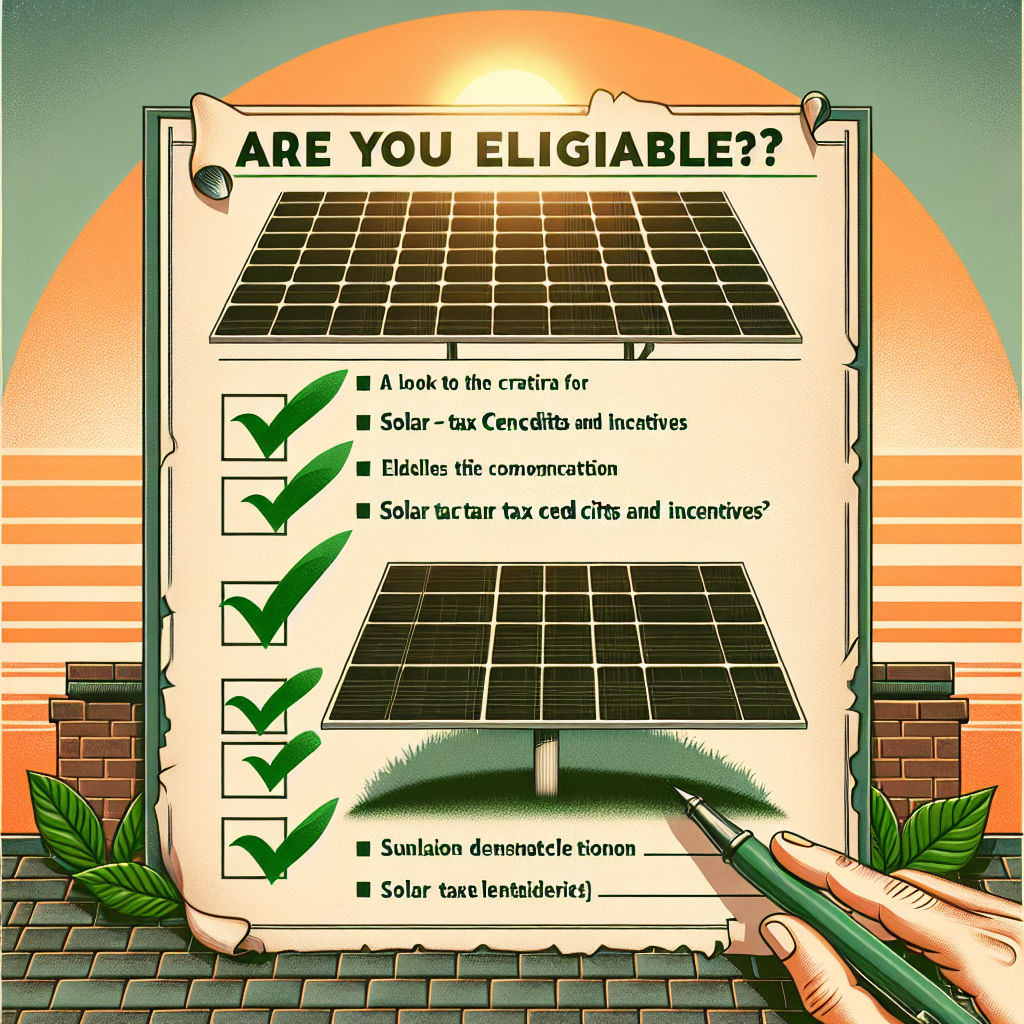As the world shifts towards sustainable energy, more homeowners are considering solar energy as a viable option. The U.S. government provides various tax credits and incentives to promote solar adoption, making it easier and more affordable for people to transition to renewable energy. But, are you eligible for these benefits? This comprehensive guide will walk you through the criteria for solar tax credits and incentives while shedding light on how you can make renewable energy part of your life.
Understanding Solar Tax Credits and Incentives
Before diving into eligibility, let’s clarify what solar tax credits and incentives are. These financial benefits help offset the costs of installing solar energy systems, enabling homeowners to save money while contributing to environmental sustainability. The Residential Renewable Energy Tax Credit (also known as the Solar Investment Tax Credit, or ITC) is one of the most notable programs, allowing you to deduct a substantial percentage of your solar installation costs on your federal tax return.
Solar Investment Tax Credit (ITC): An Overview
The ITC was designed to incentivize solar energy adoption by allowing individuals to claim a tax credit for a portion of the installation costs of their solar energy systems. Here are some vital points to note:
- Percentage of Cost Covered: The ITC covers 26% of the total installation cost of solar systems for residential properties installed between 2020 and 2022. Starting in 2023, this value will step down to 22% and continue to decrease if not extended by Congress.
- Claiming the Credit: To take advantage of this credit, you must file IRS Form 5695 along with your annual tax return.
Who Is Eligible for Solar Tax Credits?
Residential Homeowners
Primarily, the ITC is available to residential property owners who install solar energy systems. But eligibility is determined based on a variety of factors:
-
Ownership of the Solar System: Only individuals who own the solar system are eligible for the ITC. If you lease your solar panels or enter into a power purchase agreement (PPA), you cannot claim the credit. Look for ways to finance your solar project that will allow you to claim the incentives, such as a solar loan or outright purchase.
- Status of the Installation: The solar installation must be completed and operational by specific deadlines. Be aware of the date when your system is installed, as this affects the percentage credit claimed.
Qualifying Systems
Not all solar systems qualify for the ITC, so it’s essential to ensure your installation meets the requirements:
- Type of System: The ITC covers photovoltaic (PV) systems that convert sunlight into electricity. Solar water heating systems may qualify as well, but only if they meet specific criteria set by the IRS.
- Additional Equipment: Costs associated with solar batteries, inverters, and other necessary equipment are also eligible for the credit.
Additional Incentives and Rebates
Beyond the ITC, you might be eligible for various state and local incentives, rebates, and financing programs. Here’s what you should explore:
State Tax Credits
Many states offer their unique tax credits for solar installations, which can further reduce costs. For instance, California, New York, and New Jersey have attractive incentives that can work in tandem with federal credits.
Local Utility Rebates
Utility companies often provide rebates as a way to encourage homeowners to go solar. Check with your local utility provider for any available incentives.
Performance-Based Incentives (PBIs)
Some states or utilities provide performance-based incentives that pay you based on the actual energy your solar system produces over time. This not only motivates you to install a system but also rewards you for your energy production.
How to Navigate Your Eligibility
Research Local Incentives
Start by researching your state and local incentives. Websites like the Database of State Incentives for Renewables & Efficiency (DSIRE) can help you identify available programs.
Consult Solar Energy Professionals
Engaging with knowledgeable solar energy experts can provide valuable insights on federal, state, and local incentives. A qualified installer will understand the eligibility requirements and can help guide you through the process.
Keep Detailed Records
Maintain meticulous records of all installation expenses, contracts, and communication with your solar provider. This documentation will be invaluable come tax time.
Conclusion: Making Solar Energy Accessible
Eligibility for solar tax credits and incentives can often seem daunting, especially with the evolving laws and guidelines. However, understanding the basic requirements and exploring available programs can pave the way for a successful solar installation. Solar energy is not just about reducing your carbon footprint; it’s an investment in your home and future that can lead to significant financial savings. By taking advantage of the tax credits and incentives available, you’re not only making a smart choice for the environment but also for your wallet.
Embrace the solar revolution today – check your eligibility and harness the power of the sun!


